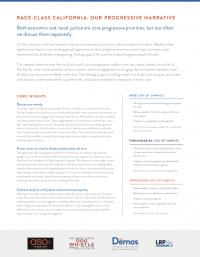Both economic and racial justice are core progressive priorities, but too often we discuss them separately.
On the contrary, racial and economic harms are intertwined, as are our desired solutions to them. Wealthy elites exploit racial fears to turn working people against each other and government; economic pain increases racial resentment and facilitates scapegoating, fueling support for punitive measures against people of color.
Our research demonstrates how to build a multi-racial progressive coalition that can create a better future for all. The key for cross-racial solidarity, policy victories, and civic engagement is bringing the connections between racial divisions and economic hardship to the fore. Our findings support tackling racism as a divide-and-conquer tactic that sows distrust, undermines belief in government, and causes hardship for everyone, of every color.
Download the full California factsheet to see the top-rated narratives, elements of the race-class narrative, and words that work
CORE INSIGHTS
Discuss race overtly
Our base, which includes many people of color, is deeply concerned about racism. Failing to address racial concerns or merely tacking them onto economic ones leaves our base unmotivated to engage, let alone persuade others. Meanwhile, most persuadables feel deep concern about race. They toggle between contradictory orientations—one that views talking about race as necessary and desires racial fairness and progressive values; and another that considers conversations about race problematic and pulls them toward racial resentment and conservative fears. The notion that we must avoid race with the middle is wrong: Remaining silent on race helps our opposition’s toxic worldview gain primacy.
Frame racism as a tool to divide and thus harm all of us
The right villainizes immigrants and African Americans as undeserving and even dangerous in order to diminish the social solidarity and support for collective action that form the foundation of the progressive agenda. Pointing out this strategic racism and tying it to the class war that a handful of wealthy reactionaries are waging helps connect the experiences of targeted people of color to those of economically anxious white people. It provides a way for people of all races to understand our noxious racial environment and makes clear that white people will gain more from cross-racial solidarity than from siding with race-baiting billionaires.
Connect unity to racial justice and economic prosperity
Making division the central problem seeds desire for unity as the response. However, it also leaves us vulnerable to claims that we too sow division. We must provide frequent endorsements for coming together, including references to having done so in the past, when calling out opponents for intentional division. “Joining together across racial differences” as a route to secure a better future moved both base and persuadables toward support for a progressive agenda.

